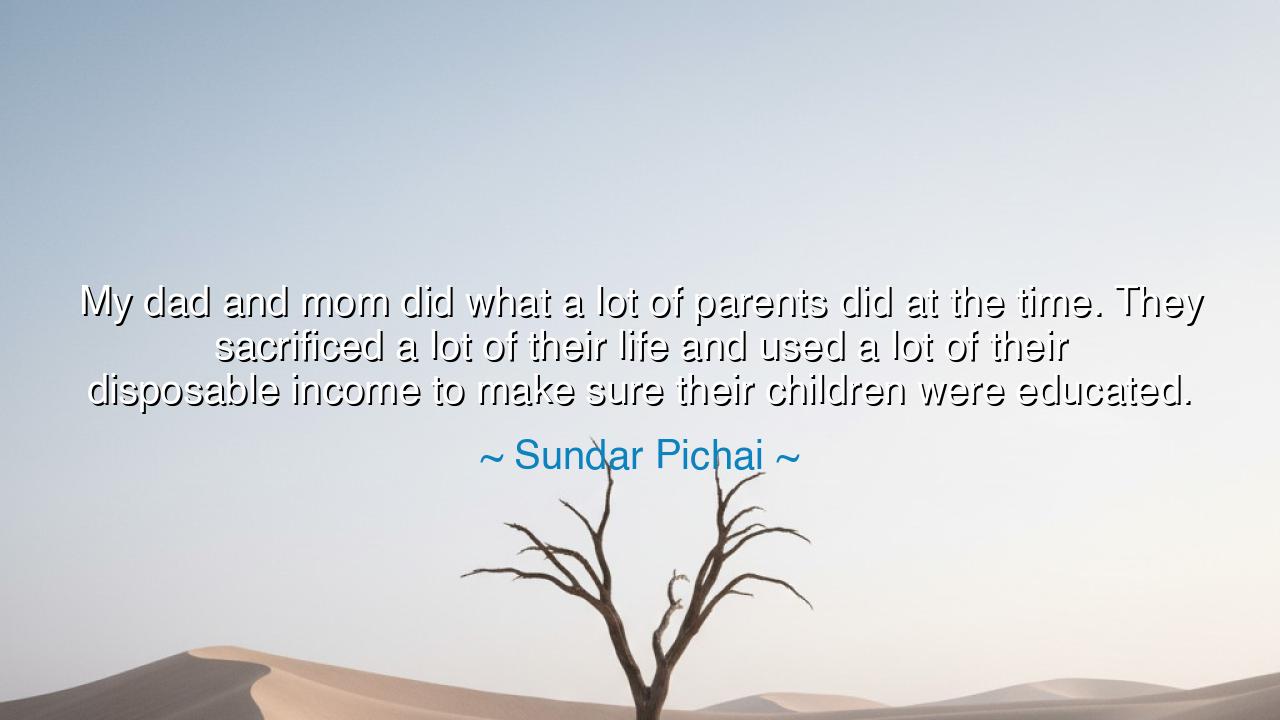
My dad and mom did what a lot of parents did at the time. They
My dad and mom did what a lot of parents did at the time. They sacrificed a lot of their life and used a lot of their disposable income to make sure their children were educated.






When Sundar Pichai said, “My dad and mom did what a lot of parents did at the time. They sacrificed a lot of their life and used a lot of their disposable income to make sure their children were educated,” he spoke not only of gratitude, but of the sacred rhythm of sacrifice and inheritance that has moved humanity forward since the dawn of civilization. In his words lies an ancient truth: that love, when purified by duty, becomes sacrifice, and that such sacrifice is the seed of all progress. A generation gives, so that the next may rise. A parent endures, so that the child may dream. And in this eternal exchange, the story of civilization itself is written — a chain of unseen heroism stretching from the huts of the past to the towers of the present.
In every age, the wise have understood that the greatest gift a parent can give is not wealth, but education — the illumination of the mind, the empowerment of the soul. The farmer who tills the soil for his son to study, the mother who goes hungry so her daughter can read, the father who walks miles to find a book — these are the silent architects of the future. Their names may be forgotten by history, but their sacrifices echo through every invention, every poem, every act of wisdom that their children create. Sundar Pichai’s words remind us that behind every success, behind every shining figure in the world, stands a foundation built by hands that often went unseen.
This idea is as old as time. Consider the story of Mencius, the ancient Chinese philosopher. His mother, known throughout history as one of the “Three Great Mothers,” moved their home three times so that her son might grow up in the right environment — away from corrupt influences and closer to places of learning. When Mencius once abandoned his studies, she cut the threads of her loom in front of him, saying, “To stop learning halfway is like breaking a weaving — it leaves nothing of worth.” Her act was not cruelty, but devotion — a lesson that his education was not his alone, but the fruit of her labor. In that moment, he understood, and he became one of the great voices of wisdom in the East. Thus, his greatness was not his own — it was also hers.
Sacrifice, then, is not a loss, but a transformation. When parents give their time, their comfort, and their earnings for their children, they are not diminishing themselves; they are planting eternity. What they give up in luxury, they gain in legacy. Their children’s learning becomes their immortality. In ancient Greece, the philosopher Plato wrote that a society’s worth could be measured not by its wealth or power, but by how it treated the education of its young. The parents who sacrificed, as Pichai’s did, are the true builders of nations, the quiet pillars upon which the future stands.
And yet, the act of sacrifice is not easy. It demands faith — faith that the seed will sprout, that the child will understand someday. Parents do not always see the fruit of their labor, for their work is an offering to time itself. Their reward is not immediate comfort, but the knowledge that they have given life its fullest chance. This is why Pichai’s reflection carries both humility and reverence — he recognizes that his own success is a continuation of his parents’ courage. In their selflessness, he found his opportunity; in their restraint, he found his wings.
The ancients would have called such parents “the keepers of the fire.” They burn a little of themselves to keep the flame of learning alive. Their children, in turn, must take up that fire and carry it forward — not to hoard it, but to share it, to light the way for others. Thus, the duty of the child is not only gratitude, but continuation. To honor their parents’ sacrifice is to live wisely, to build kindly, and to remember always where one’s light came from.
So, dear listener, let this truth dwell in your heart: education is a sacred inheritance, and sacrifice is its price. If you were raised by such love, let your life become a monument to it. Work not merely for yourself, but for those who lifted you when they could not lift themselves. If you are a parent, remember that your effort today will echo beyond your years — in the hearts and deeds of those who follow you. And if you are a child of such sacrifice, never forget to look back and whisper a silent






AAdministratorAdministrator
Welcome, honored guests. Please leave a comment, we will respond soon